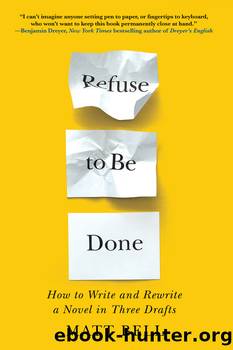Refuse to Be Done by Matt Bell

Author:Matt Bell
Language: eng
Format: epub
Tags: Nonfiction
Publisher: Soho Press
Published: 2022-01-22T21:35:58+00:00
Finishing the First Draft (While Not Worrying About Your Sentences)
I hope all these tips and tricks and habits and games will help you make your way through the daunting task of writing your first draft. For me, itâs the most difficult phase of novel writing. Filling a blank notebook or a blank document with tens of thousands of words never gets any easier, and the uncertainty involved in doing so always presses down on me. Deborah Eisenberg once described the process like this: âYou write something and thereâs no reality to it. You canât inject it with any kind of reality. You have to be patient and keep going, and then, one day, you can feel something signaling to you from the innermost recesses. Like a little person trapped under the rubble of an earthquake. And very, very, very slowly you find your way toward the little bit of living impulse.â
All these tactics weâve been discussing are ways you might reach the living impulse of your novel. Doing this requires rigorous self-kindness, a mindset as free of comparison with others or harsh judgment as possible. You want inventiveness, play, imagination; you may not receive polish or perfection at the same time. The first draft of your novel will likely not look like a book you pick up off the shelf of a store or a library, and why should it? Published novels have little to teach you about how books are written; they tell us only what novels can do once fixed in their final form.
Anne Lamott famously suggests writing âshitty first drafts,â a concept many of my students cling to for comfort while simultaneously not believing in it. They want their first drafts to emerge already perfect, even though experience and advice tell them this is not possible. That said, you will write some beautiful sentences during your first draft, and those sentences will give you the strength to keep going. Often, in my own drafts, thereâll be a small passage written fairly early on that becomes a source of encouragement for me: a paragraph or two, usually, reading exactly the way I want the whole book to read. Iâll loop back to this passage time and time again, telling myself that one day the whole book will be as strong and moving as it. Thatâs the little bit of living impulse Eisenberg talks about. However that impulse manifests in your novel, hold tight to it while also forgiving yourself everything else in your book that isnât yet as strong. Remember that your first draft is meant, first and foremost, to be exploratory, playful, and generative, a process of discovery and creation: you are learning what your story is and who your characters are; you are making the materials youâll need later to revise and rewrite your novel into a better, truer version of itself.
Jane Smiley helpfully divides the kinds of sentences you write in this exploratory draft into seeds and pebbles, saying, âIf itâs a pebble, itâs just the next sentence and it sits there.
Download
This site does not store any files on its server. We only index and link to content provided by other sites. Please contact the content providers to delete copyright contents if any and email us, we'll remove relevant links or contents immediately.
| Authorship | Bibliographies & Indexes |
| Book Industry |
Asking the Right Questions: A Guide to Critical Thinking by M. Neil Browne & Stuart M. Keeley(5745)
Autoboyography by Christina Lauren(5221)
Eat That Frog! by Brian Tracy(4507)
Dialogue by Robert McKee(4379)
Sticky Fingers by Joe Hagan(4179)
Journeys Out of the Body by Robert Monroe(3607)
Annapurna by Maurice Herzog(3458)
Full Circle by Michael Palin(3435)
Schaum's Quick Guide to Writing Great Short Stories by Margaret Lucke(3368)
Elements of Style 2017 by Richard De A'Morelli(3336)
The Art of Dramatic Writing: Its Basis in the Creative Interpretation of Human Motives by Egri Lajos(3054)
Atlas Obscura by Joshua Foer(2942)
Why I Write by George Orwell(2941)
The Diviners by Libba Bray(2924)
The Fight by Norman Mailer(2919)
In Patagonia by Bruce Chatwin(2914)
The Mental Game of Writing: How to Overcome Obstacles, Stay Creative and Productive, and Free Your Mind for Success by James Scott Bell(2893)
Venice by Jan Morris(2561)
The Elements of Style by William Strunk and E. B. White(2463)
